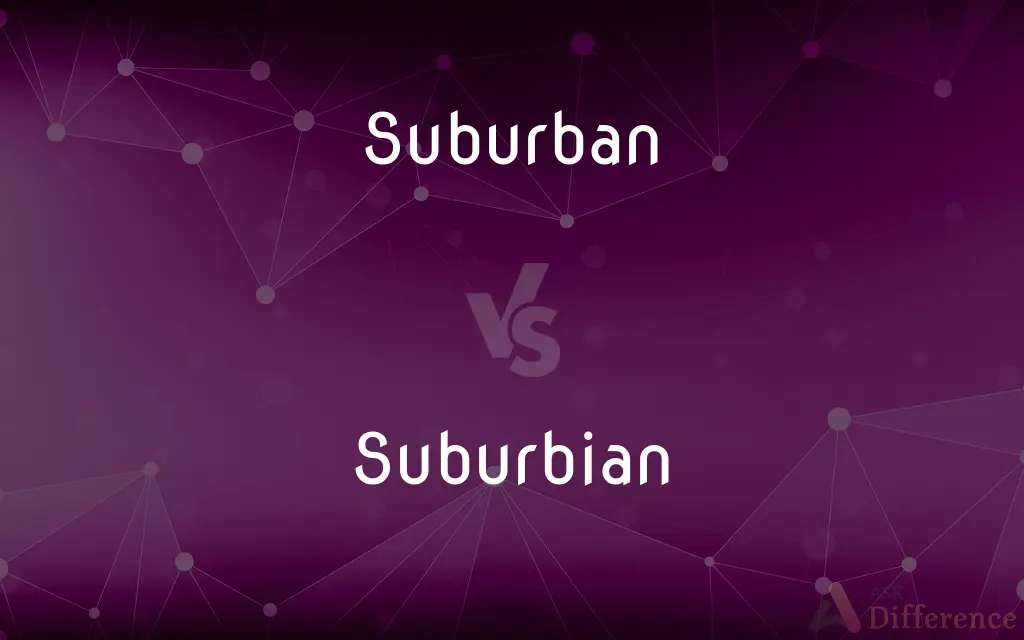Suburban vs. Suburbian — What's the Difference?
By Tayyaba Rehman & Fiza Rafique — Updated on March 3, 2024
Suburban refers to characteristics or areas related to the outskirts of a city, emphasizing residential or peripheral urban qualities. Suburbian is less commonly used and considered a nonstandard variant of suburban, generally conveying the same meaning.

Difference Between Suburban and Suburbian
Table of Contents
ADVERTISEMENT
Key Differences
The term "suburban" is widely recognized and used to describe the zones, communities, or characteristics associated with the suburbs—areas that lie on the outskirts of a city or a large town. These areas are typically characterized by residential neighborhoods, lower population density compared to urban centers, and a mix of commercial and recreational facilities designed to support the local community. On the other hand, "suburbian" is much less commonly used and is often considered by linguists and English speakers as a nonstandard or informal variant of "suburban." While it attempts to convey the same ideas associated with suburban life, its usage is not widespread in formal writing or speech.
Suburban areas are known for their appeal to families and individuals seeking a balance between the accessibility of urban life and the tranquility and space offered by rural environments. The creation of "suburbian" might be attributed to the natural linguistic tendency to form adjectives from nouns (suburb to suburbian, similar to urban to urbanian), though this particular form has not gained the same acceptance as "suburban."
Suburban areas offer distinct advantages, such as more spacious living environments, closer proximity to nature, and often a perceived higher quality of life with less congestion and pollution than urban centers. These areas are typically well-connected to cities through transportation networks, allowing residents to commute for work or leisure while enjoying the benefits of suburban living.
Educational and social services in suburban areas are also tailored to the community's needs, with schools, parks, and recreational facilities playing central roles in the social fabric of these neighborhoods. The suburban lifestyle often emphasizes community engagement, outdoor activities, and family-oriented living, which contrasts with the more anonymous or hectic pace of urban life.
Despite the similarities in meaning, the preference for "suburban" over "suburbian" in both academic and everyday language underscores the importance of adhering to standardized linguistic forms. This preference ensures clarity of communication and maintains consistency across various forms of media, literature, and discourse.
ADVERTISEMENT
Comparison Chart
Definition
Relating to or characteristic of a suburb or the suburbs.
Less commonly used variant of suburban, often considered nonstandard.
Usage
Widely accepted and used in formal and informal contexts.
Rarely used, mostly in informal contexts; considered nonstandard.
Connotation
Associated with residential neighborhoods, lower density, and community-oriented living outside urban centers.
Attempts to convey similar meanings as suburban but lacks formal recognition.
Lifestyle
Emphasizes spacious living, community engagement, and a balance between urban access and rural tranquility.
Intended to reflect suburban lifestyles but is less precise due to its limited use.
Acceptance
Standard and recognized in linguistic and academic circles.
Not widely recognized or accepted as a standard term.
Compare with Definitions
Suburban
Characterized by residential communities.
Suburban neighborhoods often have their own schools and parks.
Suburbian
Of or relating to suburbs.
The suburbian landscape is changing with new developments.
Suburban
Pertaining to the outskirts of a city.
They moved to a suburban area for more space.
Suburbian
Reflecting suburban values or culture.
The festival had a distinct suburbian charm.
Suburban
Designed for or located in a suburb.
The new shopping center caters to suburban families.
Suburbian
Characteristic of suburban life.
They enjoy the quiet, suburbian streets of their neighborhood.
Suburban
Reflecting the lifestyle of suburbia.
Their lifestyle became more suburban after having children.
Suburbian
Denoting the area around a city.
The suburbian zones are expanding as the city grows.
Suburban
Associated with lower population density.
Suburban areas are less crowded than the city center.
Suburbian
Pertaining to the people living in the suburbs.
Suburbian residents often commute to the city for work.
Suburban
Of or characteristic of a suburb
Suburban life
Suburbian
A person who resides in a suburb. Now also: a resident of suburbia.
Suburban
Of, relating to, or characteristic of a suburb.
Suburbian
Suburban, specifically with reference to the immoral or licentious practices of the suburbs, especially of London; (now) of or relating to suburbia.
Suburban
Located or residing in a suburb.
Suburbian
A person from the suburbs.
Suburban
Of, relating to, or characteristic of the culture, customs, and manners typical of life in the suburbs.
Suburbian
(obsolete) suburban
Suburban
Relating to or characteristic of or situated on the outskirts of a city.
Common Curiosities
What defines a suburban area?
Suburban areas are characterized by residential neighborhoods, lower population density, and a mix of commercial and recreational amenities, located on the outskirts of cities.
Is "suburbian" a correct term?
While "suburbian" is understood, it's considered nonstandard. "Suburban" is the widely accepted term.
Can "suburban" and "suburbian" be used interchangeably?
Although they aim to convey similar meanings, "suburban" is preferred for clarity and standard usage.
Why is "suburban" more popular than "suburbian"?
"Suburban" has a longer history of usage and is recognized in academic and linguistic standards, making it more popular and accepted.
How does suburban living differ from urban living?
Suburban living typically offers more space, closer community ties, and a quieter environment compared to the denser, busier urban living.
Can urban areas become suburban?
As cities expand, urban areas can develop suburban characteristics, especially as residential communities grow and green spaces are integrated.
How has the concept of suburban living evolved?
Suburban living has evolved to include more diverse housing, improved amenities, and better integration with urban and rural areas, reflecting changing lifestyle preferences.
Is the suburban lifestyle considered desirable?
Many people find the suburban lifestyle desirable for its balance between the conveniences of city life and the tranquility of rural areas, though preferences vary.
Do "suburban" and "suburbian" refer only to geographical areas?
While primarily describing areas, they also connote lifestyles, community structures, and cultural aspects associated with living in the suburbs.
Are suburban areas more family-oriented?
Yes, suburban areas are often designed with families in mind, featuring amenities like parks, schools, and family-friendly activities.
Share Your Discovery

Previous Comparison
Sicked vs. Sicced
Next Comparison
Russia vs. PrussiaAuthor Spotlight
Written by
Tayyaba RehmanTayyaba Rehman is a distinguished writer, currently serving as a primary contributor to askdifference.com. As a researcher in semantics and etymology, Tayyaba's passion for the complexity of languages and their distinctions has found a perfect home on the platform. Tayyaba delves into the intricacies of language, distinguishing between commonly confused words and phrases, thereby providing clarity for readers worldwide.
Co-written by
Fiza RafiqueFiza Rafique is a skilled content writer at AskDifference.com, where she meticulously refines and enhances written pieces. Drawing from her vast editorial expertise, Fiza ensures clarity, accuracy, and precision in every article. Passionate about language, she continually seeks to elevate the quality of content for readers worldwide.
















































